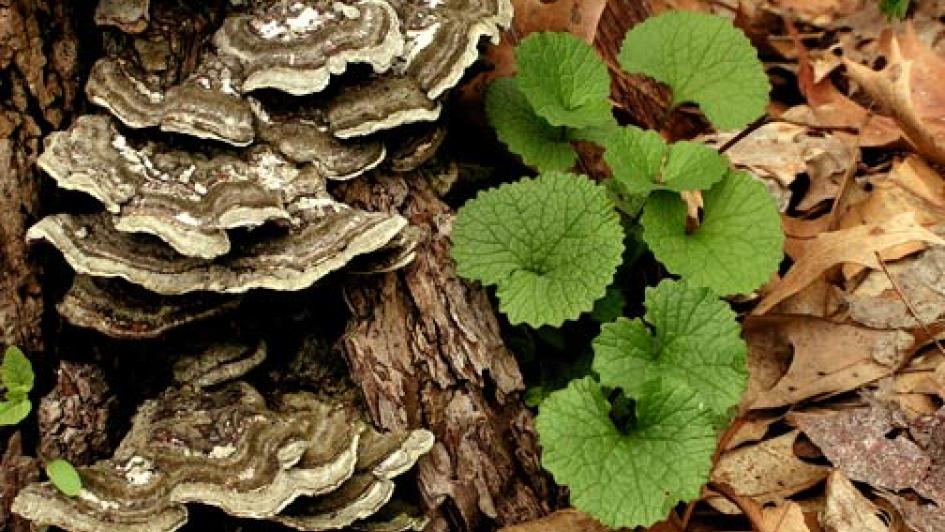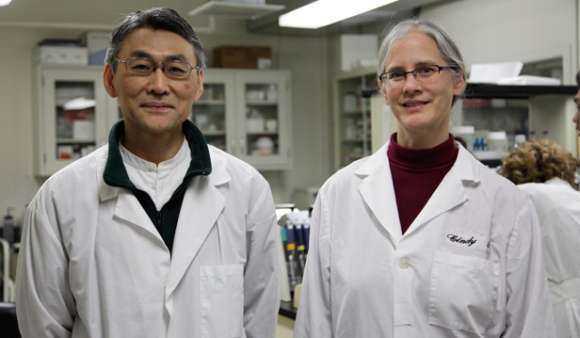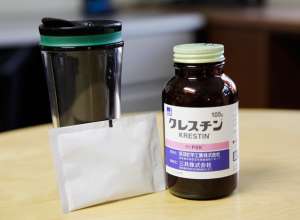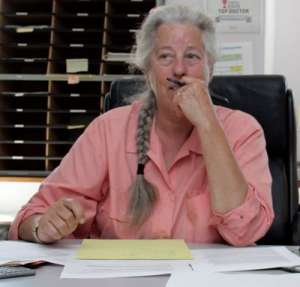FDA Approves Bastyr Turkey Tail Trial for Cancer Patients

Published
It's been brewed for thousands of years as a Chinese medicinal tea. Now Bastyr University researchers are closer to discovering whether the turkey tail mushroom (Trametes versicolor) can help cancer patients boost their immune systems during chemotherapy.
Turkey tail, named for its colorful stripes, is the humble fungus at the center of a $5.4 million collaboration between Bastyr, the University of Washington and others, funded by the National Institutes of Health (NIH). The mushroom grows widely in forests around the world, but its health potential has never been fully measured in scientific trials.
The U.S. Food and Drug Administration (FDA) recently approved a clinical trial for a turkey tail extract, allowing patients with advanced prostate cancer to take it in combination with conventional chemotherapy. Another trial pending FDA approval will test the effects of taking the extract along with a vaccine treatment in women with breast cancer. These will help researchers gather safety data and continue their development of potentially transformative cancer therapy.
"We didn't discover turkey tail," says lead investigator Leanna J. Standish, PhD, ND, LAc, FABNO, medical director of the Bastyr Integrative Oncology Research Center. "It's been used in Asia for thousands and thousands of years, and it turns out to be a really potent immune therapy. The significance, I think, is that we're bringing a new medicine to cancer patients in the U.S."
Previous research by Bastyr and the University of Minnesota found a turkey tail supplement may support conventional breast cancer therapies by strengthening a patient's immune system. That study was published recently in the peer-reviewed journal ISRN Oncology.
Chinese Medicine for Cancer Care
Turkey tail researchers predict the mushroom will fight cancer cells and strengthen the body's wellness at the same time. That dual approach is typical of traditional Chinese medicine. It's also how students approach wellness in Bastyr University's acupuncture and Oriental medicine (AOM) programs.
"In Chinese medicine, we don't treat cancer. We treat the body," says Angela Tseng, DAOM, LAc, a core faculty member in Bastyr's School of Acupuncture and Oriental Medicine. "If the person's immune system is strong, they can cope with chemotherapy treatment better. We can help build their resistance to illness."
Learn more about studying Chinese medicine at Bastyr.
Now that researchers have approval from the FDA, they plan to begin prostate cancer clinical trials in early 2013. The ultimate goal is to develop a cancer therapy without the debilitating side effects of pharmaceutical drugs.
"One of the things chemotherapy does is suppress the immune system, so our question is whether patients taking the extract can maintain healthier immune function," says Masa Sasagawa, ND, a senior project manager at the Bastyr University Research Institute.
Strengthening Immunity
Study participants recruited at the Seattle Cancer Care Alliance will take oral doses of a Japanese turkey tail extract along with docetaxel chemotherapy. Others will take a placebo and chemotherapy. Along with determining safety, lab researchers will measure the levels and activity of natural killer (NK) cells and other immune cells, which protect the body from tumors and viruses. NK cell counts and activity typically plummet after chemotherapy, leaving the body vulnerable to new diseases.
"Our hope is that docetaxel plus the turkey tail extract can create a strong enough immune response to lead to significant tumor regression," says lead investigator Cynthia A. Wenner, PhD, a Bastyr research associate professor. "That's what happened in our previous mouse trial."
Participants in the breast cancer study will also take a cancer vaccine under development.
(These studies are not recruiting new participants.)
Nature's Complexity

Gaining FDA approval — required for federally funded clinical trials — proved challenging because of the complexity of a natural product. Unlike a synthetic drug, a mushroom contains thousands of elements, each with a potential effect on the immune system.
"The FDA wants to know what the 'mechanism of action' is," says Dr. Sasagawa. "But it's very difficult to determine, because turkey tail is a natural product and not a single compound."
More challenges: Natural products vary slightly from harvest to harvest, in the same way wines from the same vineyard vary year to year. Precise research requires consistency. Also, mushrooms grown in contaminated soil collect toxins and heavy metals, making safety a concern.
To search for consistency and safety, the research team looked to a pharmaceutical-grade turkey tail product made in Japan, where turkey tail has been a widely used cancer treatment for more than 30 years. They found a solution in protein-bound polysaccharide K (PSK), a powdered turkey tail derivative produced in Japan using a hot-water extraction method.
 Turkey tail's traditional use means derivatives are probably not patentable, which has dissuaded pharmaceutical companies from funding clinical trials. It's a research dilemma that NIH seeks to address through its National Center for Complementary and Alternative Medicine (NCCAM). NCCAM has helped fund research, such as the Bastyr/UW collaboration, that integrates traditional naturopathic medicine with modern empirical standards.
Turkey tail's traditional use means derivatives are probably not patentable, which has dissuaded pharmaceutical companies from funding clinical trials. It's a research dilemma that NIH seeks to address through its National Center for Complementary and Alternative Medicine (NCCAM). NCCAM has helped fund research, such as the Bastyr/UW collaboration, that integrates traditional naturopathic medicine with modern empirical standards.
"There is a lot of knowledge accumulated by naturopathic doctors over the years, and with the help of NCCAM we've been able to investigate howsome of these medicines operate," says Mark Martzen, PhD, CIP, senior director of research development at Bastyr. "It's given us critical insight into how things work at the molecular level."
In 2010 NCCAM awarded the $5.4 million grant, known formally as the U19 Bastyr/UW Oncomycology Translational Research Center. A portion of the funding has allowed Bastyr to offer research training to students. Naturopathic medicine student Joshua Goldenberg published turkey tail-related research in the Journal of Evidence-Based Complementary and Alternative Medicine. Naturopathic medicine student Katie Strobe won a $24,000 scholarship for her work on PSK immune responses.
Mushroom-Human Relations
Finding a disease-fighting agent growing on trees, stumps and fallen logs may sound unlikely. But it wouldn't have surprised our ancestors, who relied on plants for their health-giving properties. Mushrooms were particularly important, says Dr. Standish.
 "They're incredibly important as nutrition and also medicine," she says. "Humans co-evolved with mushrooms. They are probably far more important in our biology than we imagine. North America is kind of fungi-phobic, and it may be contributing to our lousy health."
"They're incredibly important as nutrition and also medicine," she says. "Humans co-evolved with mushrooms. They are probably far more important in our biology than we imagine. North America is kind of fungi-phobic, and it may be contributing to our lousy health."
Dr. Standish believes the modern focus on disease-fighting drugs will ultimately give way to a return of plant-based medicine.
"The difference between natural medicine and conventional medicine is the dependence of conventional medicine on the single-molecule approach," she says. "Drugs are typically very potent, but quite deadly in the end, because nature doesn't work like that.
"Natural products have multiple mechanisms of action, and it is very difficult scientifically to figure out all those mechanisms. But our bodies have evolved to rely on them."
Bringing clarity to time-tested but little-understood medicines requires combining traditional wisdom and modern science, says Hailing Lu, MD, PhD, research assistant professor of oncology at UW. That's the point of the turkey tail study.
“We're excited about this,” Dr. Lu said recently. “Japan and many other Asian countries have been using this [mushroom extract] for a long time. For me, it’s a great combination. I come from China, so the use of herbal products is not new for me. This is a bridging of Eastern and Western medicine.”
----
Learn more about Bastyr's natural health study programs.

